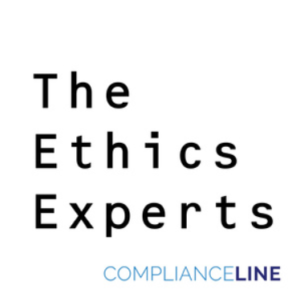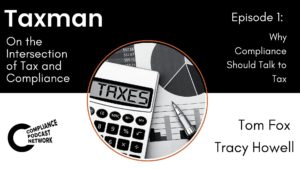
In this episode of The Ethics Experts, Nick welcomes Roy Snell. Roy Snell is a cofounder and former CEO of the Health Care Compliance Association and the Society of Corporate Compliance and Ethics.

In this episode of The Ethics Experts, Nick welcomes Roy Snell. Roy Snell is a cofounder and former CEO of the Health Care Compliance Association and the Society of Corporate Compliance and Ethics.
EU sanctions state-owned outlets RT/Russia Today and Sputnik broadcast; BIS bans export of luxury goods to Russia, Belarus.

Tom Fox is back again for a special new five-part series, Taxman: On the Intersection of Tax and Compliance. Tracy Howell, Tom’s colleague and tax expert extraordinaire, joins in to discuss the intersection between compliance and tax.
Why Should Compliance and Tax Interact?
All organizations have an enterprise risk management (ERM) system. One risk common to multinational companies especially is corporate tax risk; and yet, it tends to remain under the radar. While tax professionals are usually very good at identifying and mitigating tax risk, if there is no close interaction between compliance and tax professionals, the risks are elevated.
Sophistication in Taxing Jurisdictions
Most jurisdictions have a tax code, but street rules tend to also be in play. “You have to establish very early on that you don’t pay bribes,” Tracy advises. The results of following the law are more expensive, but it pales in comparison to the cost of putting your company at risk.
Resources
Tom Fox’s Email
Tracy Howell | Email | LinkedIn

Tom Fox is talking about purpose in this solo episode of the ESG Report. He shares insights from an HBR article, What Is The Purpose of Your Purpose written by Jonathan Knowles, Tom Hunsaker, Hannah Grove and Allison James, that talks about aligning your ESG program to your corporate purpose.
The Three Senses of Purpose
The authors identify the three senses of purpose: competence, culture and cause. There are gaps in these senses that compliance officers must overcome:
Finding Your Corporate Purpose
The authors map out a five-step approach to finding your corporate purpose, and also remedying the sense gaps. Itemizing the types of interests for your ESG program, and getting those departments to work together, will be crucial in order to get them to buy into the ESG approach. Understanding the three senses of purpose and their advantages will help compliance officers develop a clear sense of business objectives. Asking questions about your organization’s credibility to do good and bring value to society, will keep you focused on the bigger picture and help to ensure ethical behavior. By embedding purpose in corporate behavior, and from a bottom-up perspective, purpose can increase authenticity and engagement from the day-to-day experiences of customers and employees.
The Importance of Purpose
Purpose can increase customers’ preference for your products and services. Purpose can boost employee engagement. “The employees have to believe in your compliance program and do business in your compliance program by believing in it,” Tom quotes. The purpose of your organization and your ESG program can help with this. Purpose and ESG can help reinforce a company’s reputation as a good corporate citizen. Finally, purpose and ESG will allow you to respond to crises and risks in a timely manner, in ways that are impactful.
Resources
Tom Fox email
What Is The Purpose of Your Purpose
In this episode of the FCPA Compliance Report, I am joined by Professor Karen Woody from Washington & Lee Law School. We discuss the recent filing by attorneys for Elon Musk and Tesla to revoke the previously agreed to Consent Decree over his 2018 tweets about taking Tesla private at $420 per share and then withdrawing it a week later. Highlights in include:
· What is the legal basis for the Motion?
· Can a court hear an equitable claim for a regulatory consent decreed?
· What is the remedy Musk is seeking?
· What about his $20MM fine, which has been paid?
· Is the SEC harassing Musk for alleging violations of the Consent Decree?
Resources
What is the intersection of tax and compliance? Why does a Chief Compliance Officer (CCO) or compliance professional need to sit down with the corporate head of tax? How does a corporate tax function fit into a best practices compliance program? It turns out there is quite a bit a compliance professional can learn from a tax professional. Moreover, there are many aspects of tax which should be considered by a CCO and compliance professional from an overall risk management perspective. Unfortunately, these questions are rarely explored in the compliance community.
To explore these issues (and remedy this lack of awareness) I recently sat down with noted tax professional Tracy Howell to explore these and other questions. We tackled these issues and others in a five-part podcast series for Innovation in Compliance. We begin with why compliance should talk to tax and why tax needs to have a seat at the table when it comes to a best practices compliance program.
All publicly traded companies and all organizations have an Enterprise Risk Management (ERM) system. Companies, especially compliance professionals, work diligently to assess and then monitored the identified risks. Moreover, significant efforts are put in place to mitigate and manage these risks. A key risk that every multinational company’s faces is corporate tax. Unfortunately, as Howell noted, “many times corporate tax risk remains under the radar from what is characterized as your normal risk. An entity normally will identify the risk, a legal risk, environmental risk, transactional risk, supply chain risk, and others. But one of the risks that frequently doesn’t get much attention in a formalized ERM program is tax risk.”
These tax risks can be substantial, especially for multinational companies operating in many jurisdictions. Across the globe, jurisdictions are in different stages of development economically and Rule of Law sophistication, which includes tax jurisprudence. This means there are different levels of risk associated with where a company is performing its work, what type of work it is it doing, how it is delivering goods and services and the overall development of the jurisdiction.
Howell asserted that experienced international tax professionals and multinational entities are usually very good at identifying and mitigating tax risk. Unfortunately, such specialized risk management talent does not usually get outside the visibility of a tax department. Howell provided an example of a transactional risk where a company manufactured in one country and then sold the goods through a foreign affiliate in another country to a customer in a third country. “An Indian affiliate contracted with a customer in outside India. The Indian entity needed for the sale of a manufactured good in the US, but it was a drop shipment. The sale was between the Indian entity and a third-party for the delivery in a third country. Legally, the contract went from US to India to the third party in the third country. However, the flow of goods went in a different way; going directly from the US directly to the third country. Internally, the India subsidiary reported the third-party sale as income and then India was trying to deny the deduction for those goods because the goods never entered the territory of India. In other words, India is saying, okay, we’re going to tax the revenue, but we’re not going to let you deduct the cost of goods. And that’s because the goods never entered and left, were exported for the country. It was a tax risk, and it was huge.”
Typically, such a series of events would have no visibility to the corporate compliance function. Now imagine that same series of events where a tax dispute arises and goes on for literally years. Would compliance ever have visibility into it? What would happen if a bribe was paid, or other type of illegal conduct was involved to resolve it? Now you can perhaps begin to see the issue, more particularly if you consider the Lisa Monaco October 2021 speech about the Department of Justice (DOJ) reviewing all disputes and corporate culture.
This type of problem is amplified globally because of the differences in maturity of governmental tax functions across the globe. I asked Howell about this key difference. He said, “it’s the difference between night and day. I lived and worked in Canada, a very mature, sophisticated and developed tax regime, great environment for jurisprudence. And one of the things you learn once you go outside of the US to get rid of the idea of asking the question, well, this is different, why does it work that way? You focus on the rules, laws, and regulations.”
Howell then compared the maturity and sophistication of the tax regime in Canada with that in Russia. He said, “You compare it to some of the other jurisdictions that I’ve lived and worked in, most jurisdictions will all have a tax code, but the street rules or the rules of the jungle play, those are in play. You go into the remote parts of a country that’s five time zones away where it’s very cold and you’re summoned by a tax official in a very remote place, they want to audit you, you’re a multinational. You’re thinking in a traditional sense, this is very organized, there’s a tax law which is your taxable on profits, but the conversation goes something like the following, “Okay, how much tax are you going to pay me?” That’s the question that was asked by a tax official. And I said, “Well, it’s all calculated based on profits, you have the tax returns.” He said, “No, I want to know, how much are you going to pay me now to resolve this?” And he says, “I have a budget and I have to have some contributions.””
This means the tax function must establish the fact that you do not pay bribes, you do not make facilitating payments regarding tax issues, or any other types of payments and, as Howell noted, “you make it real clear. The reality is if you are doing business outside the US more than likely your organization will have complicated tax issues and while it may seem more expensive to deal with them above board, the bottom is you have to follow the Foreign Corrupt Practices Act (FCPA) so you do not put the company at risk, but you have to be strong and you have to be firm.”
Join us tomorrow when we discuss transfer pricing. Check out the full podcast series Taxman: On the Intersection of Tax and Compliance on the Compliance Podcast Network. Check out Tracy Howell on LinkedIn.